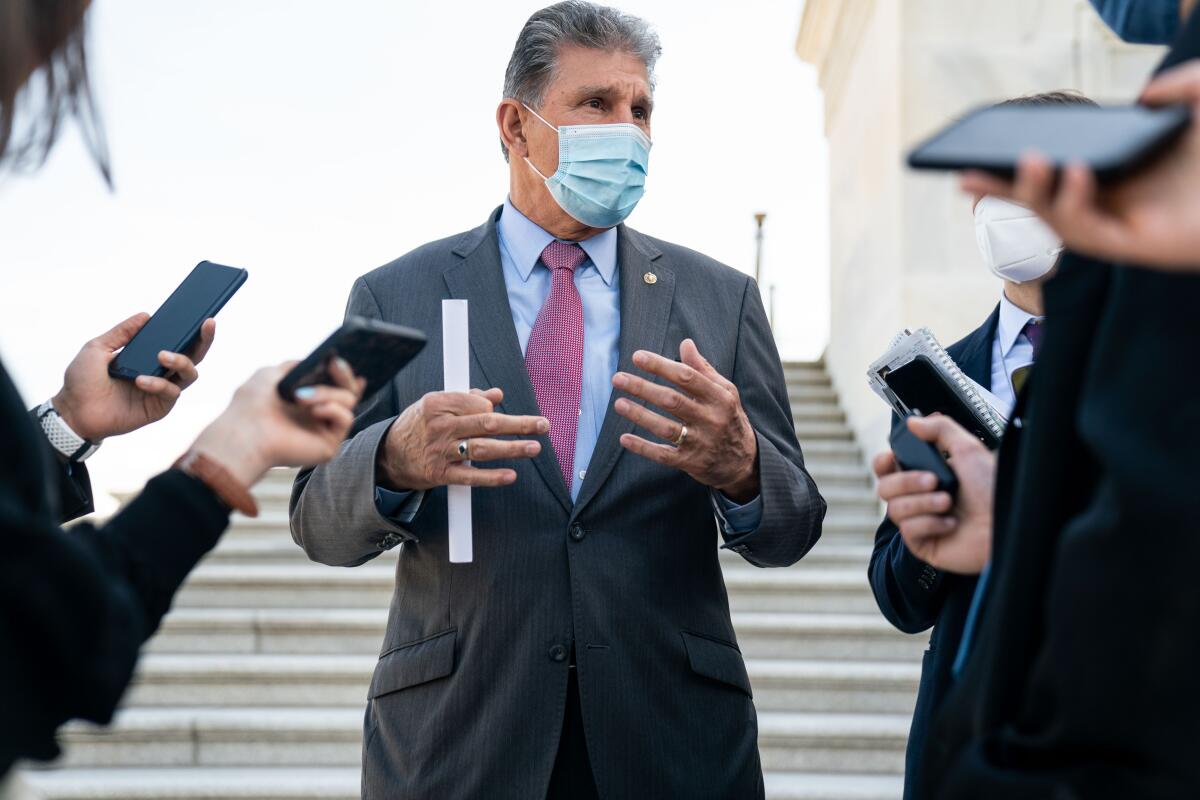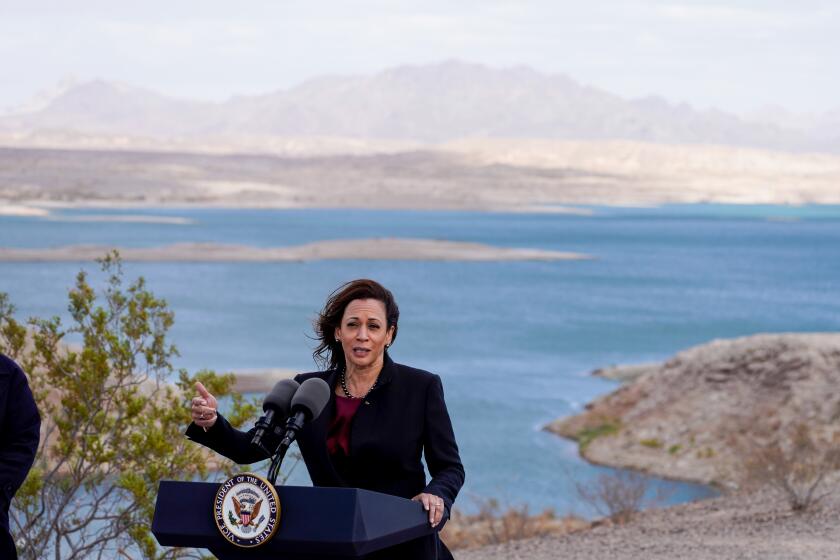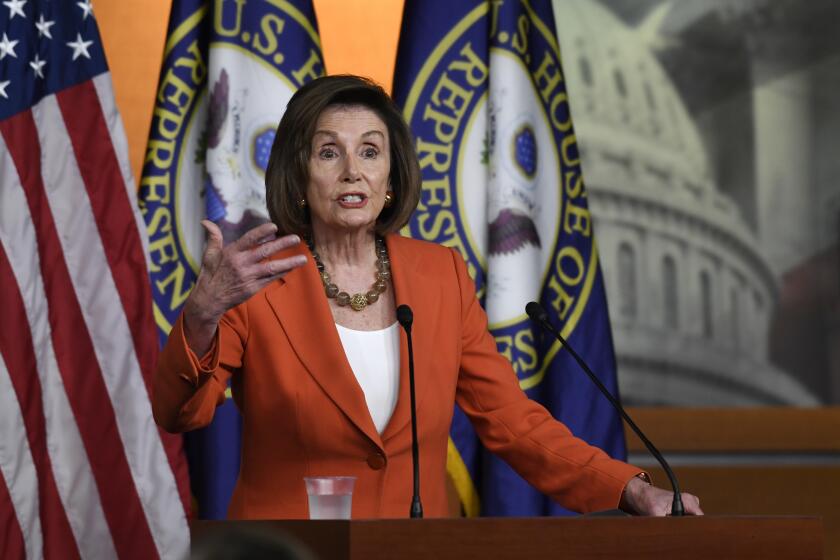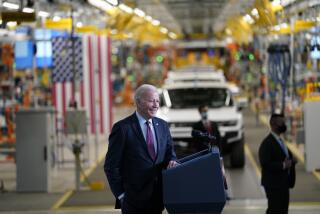Democrats want to slow climate change in a new bill. It’s proving harder than they thought

- Share via
WASHINGTON — The centerpiece of President Biden’s climate agenda is running into opposition from key moderate Democrats, raising questions about whether Congress will pass legislation that significantly slows global warming.
Biden has set a goal to reduce greenhouse gas pollution by 50% within a decade, a potentially insurmountable task without major changes in the way the country generates electricity.
Democrats had hoped Biden’s “Build Back Better” program would serve as a once-in-a-generation opportunity to combat climate change at a time when their party controls the White House and both chambers of Congress.
But as negotiations enter their most serious stage, the top climate provision is running into significant political opposition.
The plan’s Clean Electricity Performance Program, which would encourage utilities to increase their use of renewable energy through a combination of payments and fines, is opposed by Sen. Joe Manchin III of West Virginia, a key Democrat from a coal- and gas-producing state. Last year, he reported about $492,000 in dividends on stock from his family’s coal brokerage business, according to his latest financial disclosure.
Most Democrats consider the clean electricity proposal dead unless it is significantly weakened.
Democrats’ alternative pathway to address climate change, a carbon tax on polluters, has also failed to gain sufficient support. Manchin and another Democrat, Sen. Jon Tester of Montana, have said it appears unlikely to make it into the legislation.
“I’m quite concerned. We’re not where we need to be on climate,” said Rep. Jared Huffman (D-San Rafael), who met with Biden on Tuesday alongside other progressive Democrats. “My plea to the president was don’t abandon your 50% reduction goal by the end of this decade because we can’t.”
Climate has emerged as perhaps the most vexing policy area in the Democrats’ bill, which they also hope will reshape the nation’s social safety net programs.
Vice President Kamala Harris visits Nevada to stump for President Biden’s infrastructure and climate agenda.
Other portions of the bill can be tweaked around the edges or scaled down. But reducing the scope of the climate provisions would defeat the purpose of dramatically reducing the nation’s greenhouse gas emissions.
“This is one of the most challenging places for our caucus because we’re still waiting to see exactly what the agreement is around how we ensure that we get carbon emission reductions,” said Rep. Pramila Jayapal (D-Wash.), chair of the Congressional Progressive Caucus, who also attended the meeting with Biden.
Rep. Ro Khanna (D-Fremont) said progressives will meet Wednesday afternoon to consider alternative proposals to the clean electricity provision to present to the White House. “It was clear through the conversation [with Biden] that right now we need a lot more,” he said.
After months of talking about what they might put into their sweeping social safety net and climate package, Democrats are beginning serious negotiations about what proposals are in and out.
They need to take their $3.5-trillion proposal and pare it down to about $1.9 billion to meet the demands of Manchin and other centrists. Senate Democrats said Tuesday they hope to have a framework by the week’s end.
In addition to cutting the clean energy plan, a proposal to provide free community college is likely out. Extending the child tax credit may be cut from several years to only one, and paid family leave may be reduced from 12 weeks to 4 weeks as well. A proposal to lift the cap on state and local tax deductions, known as SALT, may be out.
Rep. Jimmy Gomez (D-Los Angeles), who also attended the meeting with Biden on Tuesday, said some of the proposed cuts may be reconsidered if they generate significant opposition.
Climate policy experts cite the Clean Electricity Performance Program, as the cornerstone of the Biden administration’s efforts to combat climate change.
Public opinion has moved, partly because more people now have first-hand experience with the effects of climate change. A poll this month found that a record 76% of Americans think global warming is real; only 12% think it isn’t.
The $150-billion program would take a carrot and stick approach to decarbonizing the electricity sector, pushing utilities to increase the amount of power they get from clean energy sources by at least 4% a year — roughly double the current pace of change. Those that don’t meet that standard would be penalized.
The proposal accounts for roughly a third of the carbon pollution reductions in the entire package, providing a foundation on which everything else rests.
For that reason, several Democrats are eager to find a way to win Manchin’s support. Huffman said he even pitched Biden on creating a carve-out of the program for West Virginia, though such an idea is likely politically unfeasible.
Unless utilities begin to quickly generate more power from renewable sources, experts say the United States will struggle to decarbonize transportation, home heating and manufacturing. Americans might buy more electric vehicles and heat pumps, but the electricity powering them would still come from burning fossil fuels.
With this program in jeopardy, Democrats have been forced to consider other options that might win over moderate members of their party, including a carbon tax. The tax under discussion would charge polluters a set price for every ton of carbon emissions, but would exempt gasoline to prevent drivers from having to pay more at the pump.
Beloved by economists, carbon tax proposals have been floating around Congress for years, but have never found enough support to become more than a wish list item. Most Republicans have objected to any government action that might eliminate oil and gas. And left-leaning Democrats have criticized the policy as essentially allowing polluters to buy their way out of having to shift to cleaner sources of energy.
On Tuesday, Manchin and Tester both indicated they wouldn’t support it. “I’m not a big fan of the carbon tax. I just don’t think it works,” Tester said.
Passing President Biden’s agenda will be a huge test for Nancy Pelosi, one of the most effective House speakers in history.
Antonio Bento, a professor of public policy and economics at USC who has been advising the Biden administration on its climate policies, said it’s too early to rule out a tax on carbon emissions.
“One major advantage of the carbon tax of course is that it generates revenue,” he said. By earmarking the money for pet projects of lawmakers, both conservatives and progressives might be able to support the idea, Bento said.
Climate policy experts have said that without either a clean electricity program or a carbon tax, it will be extremely difficult for the Biden administration to meet its goal of reducing the nation’s greenhouse gas emissions by at least 50% by the end of the decade.
Though the package contains a raft of other climate policy proposals, none would do as much to slash emissions, or as quickly.
The most significant remaining climate proposal in the package is a set of incentives in the form of tax credits for solar and wind energy projects and electric vehicles. Though industry groups have lobbied for these credits as an effective way to speed the transition to renewable energy sources, the incentives wouldn’t necessarily do much to force the retirement of coal- and gas-fired power plants.
An alternative Senate proposal would provide tax breaks for companies that reduce carbon emissions, with an increase in incentives as companies cut back more. The proposal, from Sen. Ron Wyden’s (D-Ore.) Senate Finance Committee, has “always been the linchpin” to achieving Biden’s goal, he said. It is not yet known which tax incentives, if any, will make it in a final bill.
The political upside to Wyden’s plan is that it could win the support of Manchin, who doesn’t want to favor renewable energy over coal and natural gas.
An analysis published Tuesday by the Rhodium Group, an independent research firm that tracks climate policies, suggested that the Biden administration still has other routes to reach its climate target. Federal agencies could take action to require polluting industries and automakers to reduce their carbon emissions. States and corporations could also step in where Congress fails.
Assuming the White House, federal agencies, states and private companies take action — and Congress passes both the pending bipartisan infrastructure bill and the Democrats’ social spending and climate package — “we find that reducing emissions 50% by 2030 is within reach,” the report said.
More to Read
Get the L.A. Times Politics newsletter
Deeply reported insights into legislation, politics and policy from Sacramento, Washington and beyond. In your inbox twice per week.
You may occasionally receive promotional content from the Los Angeles Times.















